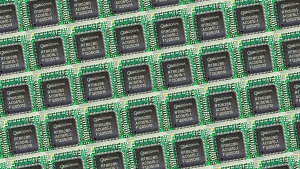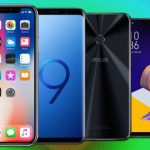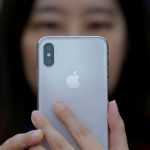In Its War With Apple, Qualcomm Tries To Save Its Business Model
By Mark Sullivan , July 20, 2017
Qualcomm beat analyst estimates in its earnings report (July 28, 2017), but revenues were well down and the mobile technology giant forecast lower-than-expected revenues for the current quarter—a reflection of its ongoing patent war with Apple.
The forecast excluded royalty payments it would normally get for its technology used in the iPhone. Apple ordered its suppliers to stop paying Qualcomm licensing fees early this year, opening a new chapter in the long-running dispute. The missing Apple royalty fees are seriously denting Qualcomm’s balance sheet. Qualcomm’s revenues fell 11.1% to $5.4 billion in the third quarter (ending June 25). Income fell to $866 million from $1.44 billion in the same quarter a year ago.
(July 28, 2017)’s earnings report helps explain Qualcomm’s July 6 decision to bring its patent licensing fee battle with Apple to the U.S. International Trade Commission, where a win could stop some iPhones from being imported into the U.S.
Taking its case to the ITC was seen by some analysts as a way to force a high-stakes showdown with Apple. But a loss there could be a lasting blow to Qualcomm’s whole business model.
The Heart Of The Dispute At The Heart Of Your Phone
Qualcomm sells modem chips that go inside cell phone and other mobile devices, and it licenses its deep chest of patented mobile communications technologies to phone makers like Apple.
The chip business is doing well: Revenue from that business unit increased 5% to $4.05 billion from last year’s third quarter. But revenues from licensing fell off a staggering 42.5% to $1.17 billion.
Apple and Qualcomm have been fighting for a long time over the Qualcomm intellectual property used in the iPhone. No one disagrees that the iPhone uses an array Qualcomm-patented technologies. At issue is the rate Apple must pay for those technologies. Apple has complained that Qualcomm is basing its licensing rates on the total value of the iPhone, and that Qualcomm is therefore asking to be paid for innovation it had nothing to do with. It also objects to paying certain licensing fees to Qualcomm while it also buys Qualcomm modem chips for the iPhone.
Apple normally pays the Qualcomm royalties through its suppliers, like Foxconn, which it then reimburses. Apple ordered its suppliers to stop paying the royalties during the March-ending quarter of this year, saying it would not reimburse any royalties payments. That action can be seen as the direct cause of Qualcomm’s appeal to the ITC, says Moor Insights & Strategy analyst Patrick Moorhead.
“It’s unprecedented,” Moorhead said. “From a Qualcomm point of view it’s their entire business model that’s at stake.” If Apple is allowed to get away with not paying, other tech companies may try to stop paying too.
For Apple, the stakes could be equally high. Qualcomm has asked the ITC to stop the import of all iPhones that use an Intel modem chip (for operation on the T-Mobile and AT&T networks). This would include Apple’s latest model, the iPhone 7, and, possibly future iPhones.
The ITC has a history of moving quickly toward decisive judgments with binding results. It has in the past blocked the import of patent-infringing tech products into the U.S. (See the case of Cisco v. Arista.)
“The ITC doesn’t mess around,” says Moorhead, who spent 11 years working with intellectual property at a chip company. “The ITC is like the United Nations with teeth.”
What Can The ITC Do?
Patent licensing fee disputes are often settled when a federal district court sets an appropriate licensing rate, Moorhead said, but the ITC does not and will not facilitate arbitration between Qualcomm and Apple to find a licensing fee structure both companies can agree on.
(However, it’s notable that Qualcomm filed an identical complaint against Apple in the U.S. District Court for the Southern District of California at the same time it filed with the ITC. The complaint seeks damages and injunctive relief.)
Intellectual property owners sometimes use an ITC appeal as a legal maneuver to apply maximum pressure on patent violators. The ITC usually takes 18 months to conclude an investigation and issue a ruling. This is seen as a quicker and more decisive legal avenue than asking for an injunction in federal district court, and then defending against appeals potentially for years. Qualcomm says it expects the ITC investigation will get going in August and be tried sometime next year.
Despite Apple’s statements in court filings that Qualcomm’s business model is “illegal” and based on “extortion,” the dispute between the two companies is long-running, complex, and involves many patents–some more important than others. “Apple has done a good job of simplifying the situation to its benefit,” says Moorhead.
The core of the dispute is over “essential patents.” That means patented technology that the phone maker (in this case Apple) must use to comply with an industry telecommunication standard, in this case a cellular communications standard overseen by the 3GPP.
Standards bodies (in this case, the 3GPP) require that companies that hold “essential” patents license them on “fair, reasonable, and non-discriminatory (FRAND) terms.” Apple claims Qualcomm is charging licensing rates that are not fair and reasonable.
Apple says its suppliers should not pay royalties until Qualcomm has set a fair rate. Apple CEO Tim Cook has said that an ITC ban on imports is not likely because no rate has been set.
The current legal war began when Apple sued Qualcomm for $1 billion in a federal district court in San Diego in January. Apple’s major suppliers–Foxconn Technology, Compal Electronics, Pegatron Corp., and Wistron Corp.–filed suit in the same court Tuesday night. The Federal Trade Commission has also sued Qualcomm, partly based on a complaint from Apple, alleging that the chipmaker’s contracts unfairly discouraged customers from using competitors’ chips.
Qualcomm says Apple is merely using its largesse and bargaining power to pay less royalty dollars. “If you peel apart all of the arguments Apple’s making, we believe firmly they’re all without merit,” says Qualcomm president Derek Aberle, who leads the company’s licensing business.
“At the end of the day, they essentially want to pay less for the technology they’re using,” Aberle says. “It’s pretty simple.”
Qualcomm makes much of its cash by licensing chip and phone patents to phone makers. Apple says the rates are too high. The endgame could be seismic for both.
Qualcomm beat analyst estimates in its earnings report (July 28, 2017), but revenues were well down and the mobile technology giant forecast lower-than-expected revenues for the current quarter—a reflection of its ongoing patent war with Apple.
Fast Company , Read Full Story
(44)













